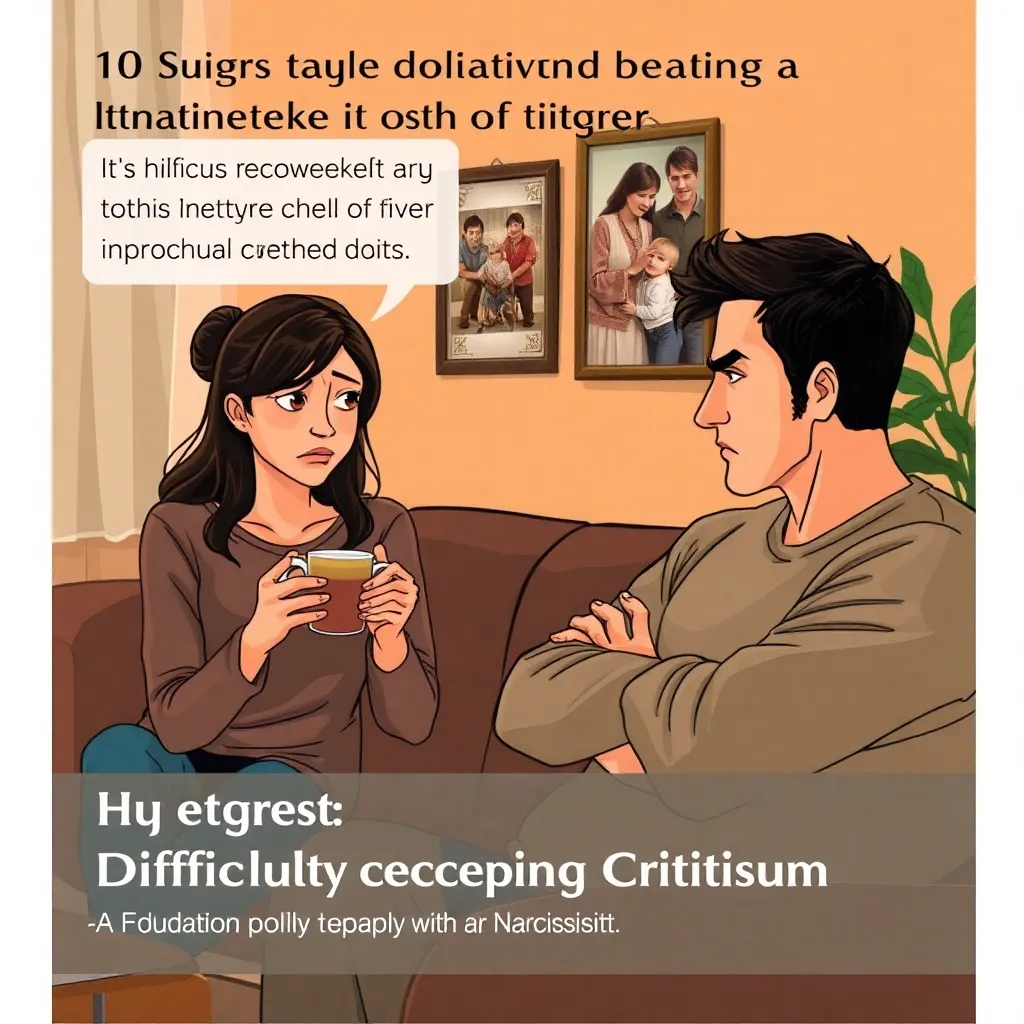Navigating relationships can sometimes feel like walking through a maze, especially when you suspect that someone you care about might be exhibiting narcissistic traits. It’s natural to feel confused and even overwhelmed when the person who should be a source of joy seems to leave you questioning your own reality. Understanding the dynamics of a relationship with a narcissist is crucial, as it can deeply affect your emotional well-being and self-esteem. By identifying key signs, you can make more informed decisions about how to protect your mental and emotional health.
Recognizing narcissistic behavior is not about labeling or judging; it’s about gaining clarity in what might be a turbulent relationship. This article will guide you through ten tell-tale signs that could indicate you’re dealing with a narcissist, empowering you with knowledge and perspective. As you read on, you’ll learn how to spot these behaviors, understand their impact, and consider steps to address them. It’s about creating awareness, so you can navigate your relationships with confidence and care.
No one deserves to feel diminished or manipulated in their relationships, and acknowledging these signs is the first step towards reclaiming your peace. We hope this guide will serve as a beacon of understanding, offering insights that resonate with your experiences and feelings. Let’s embark on this journey together, with empathy and a commitment to nurturing healthier, more fulfilling connections.
1. Lack of Empathy for Others

One of the most telling signs of a narcissist is their glaring lack of empathy for others’ feelings and needs. Imagine sharing your most vulnerable moment with a partner, only to receive a dismissive response or a change of subject—it feels isolating and invalidating.
Narcissists often struggle to understand or even acknowledge the emotions of those around them. For instance, if you’re upset about a challenging day at work, they might focus solely on their own day’s events, showing little regard for your feelings.
Experts suggest that this lack of empathy is not just a minor inconvenience but a fundamental trait of narcissism that can deeply impact relationships. When a partner consistently fails to show concern or compassion, it can lead to feelings of frustration and loneliness.
To navigate such relationships, it’s crucial to set clear emotional boundaries. Communicate your expectations regarding emotional support, and don’t shy away from seeking outside help if needed.
Ultimately, recognizing a narcissist’s lack of empathy allows you to manage your expectations and take proactive steps to protect your emotional health. Remember, you deserve relationships where empathy and understanding are mutual.
2. Constant Need for Admiration

Another hallmark of dealing with a narcissist is their constant need for admiration. Imagine being in a relationship where your partner frequently seeks praise and approval, not just from you but from everyone around. This behavior can manifest in various ways, such as fishing for compliments or exaggerating achievements to gain attention. Partners in such relationships often feel emotionally drained as they struggle to meet this insatiable need.
In relationships with narcissists, the focus often shifts away from mutual support to a one-sided admiration fest. It’s common to find yourself in scenarios where your accomplishments are overshadowed by their need to be the center of attention. This can lead to feelings of neglect and frustration, as your own needs are continually sidelined. Over time, this dynamic can erode the foundation of a healthy partnership.
Experts suggest that this need stems from an underlying sense of insecurity, masked by a facade of confidence. When a partner constantly demands admiration, it can signal deeper issues that need addressing. Understanding this can help you navigate the relationship more effectively, allowing you to set healthy boundaries. If you find your partner’s behavior affecting your well-being, it might be time to seek professional guidance.
To maintain your emotional health, it’s crucial to find ways to balance their need for admiration with your own needs. You can gently remind them of the importance of mutual appreciation in a relationship. This approach not only fosters understanding but can also reignite the spark of mutual respect and admiration.
Remember, every relationship requires effort from both sides to thrive. By recognizing these patterns and addressing them, you can work towards a more balanced and fulfilling partnership. The journey may be challenging, but understanding and addressing these traits can lead to healthier interactions.
3. Sense of Entitlement

In a relationship with a narcissist, you may notice an overwhelming sense of entitlement that permeates their behavior. This entitlement often manifests as an expectation that their needs should be prioritized above all else, regardless of the impact on you or others.
Picture a scenario where your partner insists on picking the restaurant for every date night, dismissing any suggestions you make. This kind of behavior isn’t just about preferences; it reflects a deeply ingrained belief that their desires are inherently more important than yours.
Experts suggest that this entitlement stems from a lack of empathy and an inflated sense of self-importance. Recognizing this pattern can help you understand why your partner might react negatively when faced with even minor inconveniences or compromises.
To handle this dynamic, establish firm yet compassionate boundaries. Clearly communicate your own needs and ensure there is room for your preferences in the relationship.
Ultimately, recognizing a partner’s entitlement as a sign of narcissism can empower you to make informed decisions about the relationship. It’s important to prioritize your well-being and seek a balanced partnership where both parties’ needs are valued.
4. Frequent Gaslighting Tactics

A common tactic employed by those with narcissistic tendencies is frequent gaslighting, which involves manipulating someone into doubting their own reality. Imagine a scenario where you recall an event clearly, but your partner insists it happened differently, leaving you feeling confused and questioning your memory.
Gaslighting can subtly erode your self-confidence and make you feel disconnected from yourself. In a relationship, this may manifest as your partner dismissing your feelings or claiming you’re too sensitive, which can lead to a cycle of self-doubt.
Experts suggest that recognizing these behaviors is the first step toward protecting your mental health. If you find yourself frequently questioning your own perceptions, it’s essential to seek a supportive friend or therapist who can provide an outside perspective.
Being aware of these tactics helps you maintain your emotional equilibrium and sets the stage for healthier boundaries.
Always trust your instincts and remember that a healthy relationship should never make you question your worth or sanity.
5. Disregard for Your Feelings

When you’re in a relationship with a narcissist, you might find that your feelings are consistently dismissed. Imagine sharing your excitement about a promotion, only to have them change the subject to their own achievements. Over time, this pattern of disregarding your feelings can erode your self-worth and make you feel invisible in the relationship.
Another aspect of this disregard is when your partner minimizes your emotions during conflicts. You might express hurt or disappointment, only to be told that you’re being overly sensitive or dramatic. This not only invalidates your experiences but also creates a toxic environment where you feel unheard and undervalued.
In healthy relationships, partners strive to be each other’s emotional support. However, with a narcissist, your emotional needs are often an afterthought, if considered at all. This lack of empathy can leave you feeling isolated and neglected, further impacting your emotional well-being.
Experts suggest that a consistent pattern of emotional neglect is a significant red flag. It is essential to assess whether your partner is willing to acknowledge and change this behavior. Ultimately, a relationship should be a space where both partners feel valued and respected, leading to mutual growth and happiness.
6. Manipulative Behavior Patterns

Recognizing the signs of a narcissist often involves understanding their subtle yet destructive behaviors. One of the most telling indicators is their use of manipulative behavior patterns to control and influence those around them. Manipulation can manifest in many ways, including emotional blackmail or playing the victim to elicit sympathy. In relationships, this often leaves partners feeling confused and questioning their own perceptions.
Consider a scenario where your partner frequently uses guilt to get their way, perhaps by saying, “If you really loved me, you would do this for me.” This is a classic example of emotional manipulation and can lead to a cycle of guilt and compliance. The goal is often to undermine your sense of self-worth and make you more reliant on their approval. Over time, this can erode your confidence and blur the lines between genuine care and coercion.
Experts suggest that one effective way to counter such behavior is to establish and communicate clear boundaries. According to relationship counselors, creating a firm boundary acts as a protective measure against manipulative tactics. When faced with such behavior, calmly assert your stance and avoid engaging in arguments that only feed the manipulator’s need for control. Remember, it’s essential to prioritize your emotional health in these interactions.
In dealing with a narcissist, awareness is your most powerful tool. By identifying and understanding these manipulative tactics, you can better protect yourself from their influence. It’s important to trust your instincts and seek support if needed. Always remember that you deserve relationships built on mutual respect and authenticity.
7. Obsessive Focus on Appearance

Consider the individual who is always impeccably dressed and seems to spend an inordinate amount of time on their appearance. This person may be exhibiting an obsessive focus on appearance, which is a common trait among narcissists, as they often equate their self-worth with how they look.
In relationships, this can manifest as a partner who prioritizes their own looks above all else, even when it detracts from the relationship’s emotional depth. They might judge their partner’s appearance harshly, expecting them to maintain equally high standards, which can be draining and demoralizing.
Experts in psychology suggest that this preoccupation with appearance stems from a need for validation and admiration. When a narcissist feels they are being visually admired, it temporarily satiates their need for external validation, reinforcing their behavior.
While it’s natural to want to look good, an unhealthy obsession can damage the relationship by overshadowing more meaningful connections. If you find yourself feeling inadequate or pressured, it’s important to communicate your feelings and set boundaries around such expectations.
Ultimately, understanding the root of this obsession can help you navigate your relationship with empathy and assertiveness. By recognizing these patterns, you can protect your self-esteem and foster a more balanced partnership.
8. Difficulty Accepting Criticism

Many people find it challenging to accept criticism, but for a narcissist, this difficulty is often magnified. They may react with intense defensiveness or even anger, as they perceive any critique as a direct threat to their self-esteem. Imagine a scenario where a partner gently suggests a more efficient way of handling household chores. Rather than seeing it as constructive, the narcissist might interpret it as an attack on their competence, leading to a heated argument.
In relationships, this inability to handle criticism constructively can create a hostile environment. Partners might feel like they are constantly walking on eggshells, afraid to express even the most constructive feedback. Consider how exhausting it can be to never feel heard or understood simply because the other party refuses to acknowledge any faults. This dynamic often leads to increased frustration and resentment over time.
Experts in psychology often note that narcissists have a fragile ego beneath their confident façade, making them particularly sensitive to criticism. According to Dr. James McNulty, a well-known psychologist, understanding this fragility can help partners develop strategies to communicate more effectively. By approaching discussions with sensitivity and focusing on the positive, it’s possible to minimize conflict while still addressing important issues.
For those in relationships with a narcissist, learning to communicate effectively is crucial. One strategy is to frame feedback in a way that highlights positive outcomes rather than focusing solely on the negative aspects. This approach can sometimes help bypass defensiveness, leading to healthier conversations.
Ultimately, dealing with a narcissist’s difficulty in accepting criticism requires patience and a strategic approach. By fostering a supportive dialogue, it’s possible to navigate these conversations more smoothly and maintain a healthier relationship. Remember, while change can be slow, small adjustments in communication can lead to significant improvements over time.
9. Exaggerated Achievements and Talents

In relationships, it’s not uncommon to encounter individuals who consistently boast about their supposed achievements and talents. Often, these claims are exaggerated, and the person may even take credit for others’ accomplishments. This can be a telltale sign of narcissistic behavior, where the need for admiration outweighs the reality of their contributions.
Imagine being with someone who constantly reminds you of their supposed extraordinary accomplishments. They might insist on sharing their success stories at every social gathering, regardless of whether or not they are relevant to the conversation. This behavior often stems from a deep-seated need for validation and admiration, which can become exhausting for those around them.
It’s crucial to recognize that such exaggerations are often a mask for insecurities and a lack of self-esteem. According to relationship experts, this behavior can serve as a defense mechanism, protecting the individual from facing inner vulnerabilities. Understanding this can help you respond with empathy rather than frustration, allowing for healthier interactions.
When you notice a pattern of exaggerated claims, it can be helpful to gently encourage honesty and authenticity. You might suggest focusing on achievable goals and celebrating genuine successes, which can foster a more grounded sense of self-worth. By doing so, you can help the person shift from seeking external validation to cultivating inner confidence.
Confronting narcissistic tendencies requires patience and understanding, as these behaviors are deeply ingrained. It’s important to set clear boundaries and communicate openly about how their actions affect you. By fostering an environment of honesty and mutual respect, you can navigate the complexities of dealing with exaggerated achievements in a way that reinforces the health and longevity of your relationship.
10. Persistent Desire for Control

In relationships with a narcissist, you might notice a persistent desire for control over various aspects of life. This control can manifest subtly, with decisions about what to eat or where to go being dictated without room for discussion.
Often, this need for control stems from a deep-seated anxiety about appearing vulnerable or imperfect. A narcissist may insist on dictating every detail of a shared project, ensuring their vision is the only one that comes to life.
Consider the scenario where a partner insists on managing the household finances, even if it means excluding you from important decisions. Such behavior is not just about financial control but reinforces their belief that they know what’s best, invalidating your input.
Experts suggest that this need for control often leads to a partner feeling disempowered or silenced over time. In such situations, it’s crucial to assert your boundaries kindly but firmly, ensuring your voice is heard and respected.
By understanding these dynamics, you can better navigate the relationship and make informed choices about your needs and boundaries. Remember, a healthy relationship thrives on mutual respect and shared control, not one-sided dominance.
Conclusion: Creating Beautiful Outdoor Spaces
Recognizing narcissistic traits in a relationship is crucial for your emotional well-being and future happiness. Throughout this article, we explored ten key signs: excessive need for admiration, lack of empathy, manipulative behavior, grandiosity, entitlement, envy, exploitative tendencies, arrogance, sensitivity to criticism, and a constant need for control. Understanding these behaviors can empower you to make informed decisions about your relationships.
As an immediate next step, take a moment to reflect on your interactions with those around you. Are there patterns that align with these signs? Awareness is the first step to reclaiming your emotional health. If you suspect you’re dealing with a narcissist, consider seeking support from a therapist or trusted friend to help navigate your next steps.
Don’t let this valuable insight slip away—bookmark this article now to easily reference these signs and strategies when needed. Your relationships are a journey, and with awareness and intention, they can lead to profound personal growth and fulfillment. Embrace this opportunity to foster healthier connections and pave the way for a more harmonious and successful relationship future.
